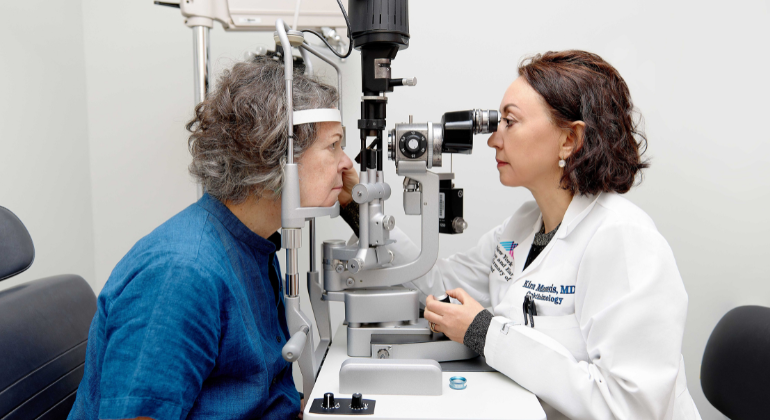June is Cataract Awareness Month
Mount Sinai Experts Available to Discuss Tips & Information on the Leading Cause of Vision Loss in People Over Age 40
Cataracts are the leading cause of vision loss in Americans 65 and older and the principal cause of blindness in the world. In fact, there are more cases of cataracts worldwide than there are of glaucoma, macular degeneration, and diabetic retinopathy combined. To observe Cataract Awareness Month in June, ophthalmologists from New York Eye and Ear Infirmary of Mount Sinai (NYEE) and The Mount Sinai Hospital (MSH) – both part of the Mount Sinai Health System – are offering prevention tips and raising awareness of options for early detection and effective treatment.
Experts Available for Interview
- Kira Manusis, MD, Assistant Professor of Ophthalmology and Co-Director, Cataract and Refractive Surgery, NYEE
- Michelle K. Rhee MD, Assistant Professor of Ophthalmology, Icahn School of Medicine at Mount Sinai, and Co-Director, Refractive Surgery Service, MSH
Facts about Cataracts
- A cataract is the clouding of the natural lens of the eye, the same part of the eye responsible for focusing light and enabling you to see clear images.
- Aside from the normal aging process, additional causes for developing cataracts include: eye injury; systemic conditions such as diabetes; the use of certain medications; long-term unprotected sun exposure; smoking; and a family history of cataracts.
- Symptoms can include: blurry vision; sensitivity to light, glare; fading of colors; difficulty reading; double vision; and frequent changes in prescription of eyeglasses or contact lenses.
- Small cataracts may not cause any noticeable symptoms. As cataracts progress they cause limitations in the activities of daily living such as reading, driving, and watching TV.
- The condition can be treated with surgery by removing the clouded human lens and replacing it with an artificial lens implant. This surgery is easily tolerated and performed at an outpatient setting.
- Cataract surgery is one of the most commonly performed medical procedures in the United States, with more than three million surgeries performed each year.
Tips for Cataract Diagnosis and Treatment
- Because cataracts are so common in older adults, it's important to have your eyes examined on a regular basis.
- People aged 40 to 64 should have a comprehensive eye examination every two to four years; people 65 and older should have a comprehensive eye examination every one to two years.
- People with a history of eye problems or other medical conditions that increase the risk of eye disease - such as diabetes - should have eye exams more frequently (once a year or as recommended by your doctor).
- New treatments for cataract include laser-assisted surgery that combines a femtosecond laser (ultrafast laser), 3D imaging, sophisticated software, and a number of other innovative features that make the cataract procedure customized and more precise.
- New artificial lenses used during cataract surgery may offer patients better quality of vision and lower dependence on glasses.
About the Mount Sinai Health System
Mount Sinai Health System is one of the largest academic medical systems in the New York metro area, with 48,000 employees working across seven hospitals, more than 400 outpatient practices, more than 600 research and clinical labs, a school of nursing, and a leading school of medicine and graduate education. Mount Sinai advances health for all people, everywhere, by taking on the most complex health care challenges of our time—discovering and applying new scientific learning and knowledge; developing safer, more effective treatments; educating the next generation of medical leaders and innovators; and supporting local communities by delivering high-quality care to all who need it.
Through the integration of its hospitals, labs, and schools, Mount Sinai offers comprehensive health care solutions from birth through geriatrics, leveraging innovative approaches such as artificial intelligence and informatics while keeping patients’ medical and emotional needs at the center of all treatment. The Health System includes approximately 9,000 primary and specialty care physicians and 11 free-standing joint-venture centers throughout the five boroughs of New York City, Westchester, Long Island, and Florida. Hospitals within the System are consistently ranked by Newsweek’s® “The World’s Best Smart Hospitals, Best in State Hospitals, World Best Hospitals and Best Specialty Hospitals” and by U.S. News & World Report's® “Best Hospitals” and “Best Children’s Hospitals.” The Mount Sinai Hospital is on the U.S. News & World Report® “Best Hospitals” Honor Roll for 2024-2025.
For more information, visit https://www.mountsinai.org or find Mount Sinai on Facebook, Instagram, LinkedIn, X, and YouTube.
